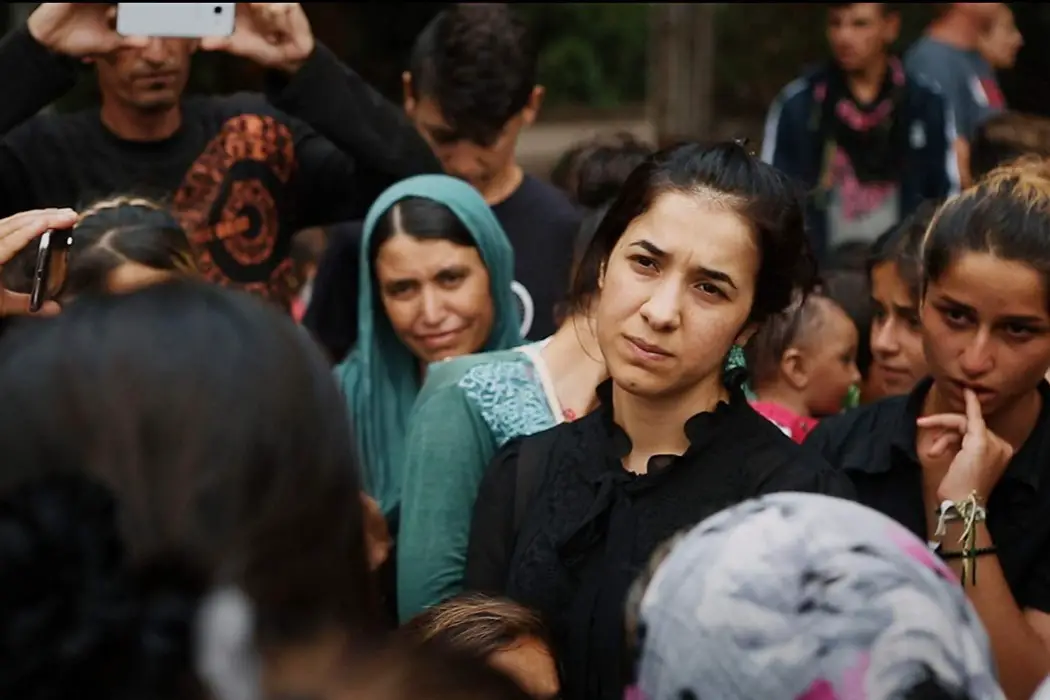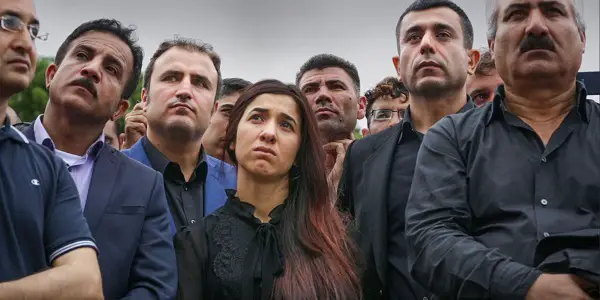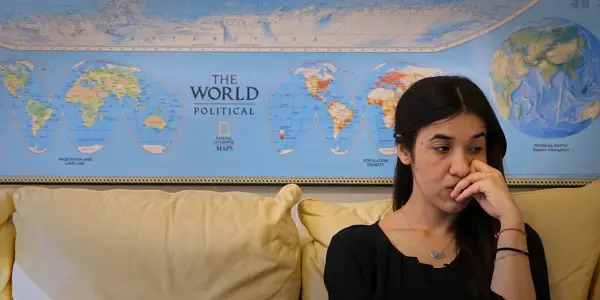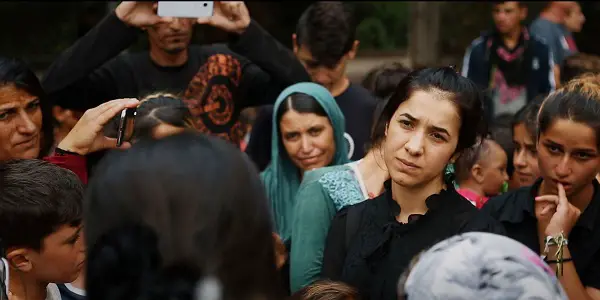ON HER SHOULDERS: Powerful Documentary Exposes Wrongheaded Media Portrayal

Musanna Ahmed is a freelance film critic writing for Film…
On Her Shoulders opens with a stomach-turning scene of Yazidi activist Nadia Murad navigating the exit of a significant meeting with her team through a crowd that’s disgustingly thirsty for ‘likes’. There’s probably more cameras on her on this street than there was in her meeting with the UN General Assembly, as the mob of selfie-takers uncomfortably surround her.
Away from the exploitative public…
Subsequently, she’s placed alone in the frame for a sit-down interview with director Alexandria Bombach. Juxtaposed with a news clipping of Nadia hiding her face when she first spoke to the press after escaping from Iraq, where she was kidnapped by ISIS, this image of her facing the camera is alone powerful in expressing her fight for human rights.

Bombach creates meaning through selectively focused images combined with strong editing choices and the big picture is not only a depiction of Nadia’s seminal journey in the spotlight but also a sharp indictment of Western media, a subtle commentary on judicial action – or inaction – and a compelling study of male feminism.
The Nobel Peace Prize winner has a truly harrowing story that needs to be heard by everyone. It depicts the genocide of an ethnic minority in her hometown; Islamic State fighters killed 600 Yazidi citizens, including six of Nadia’s siblings, in the Iraqi village Kojo. She was raped and enslaved by ISIS, along with many other imprisoned women, and successfully fled the country (now resides in Germany) with help from a neighbouring family. She’s shared and re-shared her haunting experience countless times on platforms online, in print and on television.
Bombach is less concerned with asking Nadia to repeat her story one more time and chooses to instead focus on the media’s reactions. Perhaps the most outstanding feature of this documentary is an expertly assembled montage of talk show interviews wherein we realise the same questions that Nadia is asked again and again and the increasing emotional drain she receives from hearing them. “What did they do to you? Do you think about it? What do you want to do now?”
Away from the inward-looking media…
Maybe for the first time on camera, Nadia is able to be upfront about how she feels about this exhausting circuit of queries – as important as they may be, please stop asking her these repetitive, exclusive questions and let’s instead discuss what’s happening to the other women and what must be done to protect the Yazidi people.

City of Ghosts director Matthew Heineman once spoke of his film, which also follows Arabic speakers, about the fact that he couldn’t speak the language himself so, when it came to filming conversations, he would focus on their facial expressions to help him understand the emotional weight in each discussion. I’m not sure if Bombach speaks Arabic or not but she employs a similar, purely observational approach in capturing the character of Nadia.
There’s room for filming more moments in her daily life but the ones we get show her in serene, mundane scenarios, in contrast with the undercurrents of life in Iraq – “If this was Iraq somebody would have blown themselves up” comments her interpreter Murad, when they both observe a crowded scene.
Murad is the second key figure of the documentary, fascinatingly observed through a cultural lens. As Nadia describes him, he’s a 30-something man who could have had a simple life, settling with a wife and kids by now like many Iraqi men, but has set all that aside for the cause of the Yazidi people.
Men and women facilitating change together
At the time of filming, Murad has worked with Nadia for at least ten months and is also interviewed for this documentary. Speaking in regard of Nadia’s intended return to the village when “things get better”, he gloomily comments that the reality will not present a positive culture – it will be one with only widows and orphans.

Murad admits to being less optimistic about things getting better for the village than Nadia, but he’s steadfast in his belief in the woman, saying she’s the figurehead of an urgent campaign. It’s through Murad and Luis Moreno Ocampo, a former prosecutor of the international criminal court who provides helpful guidance, where the film engages with the need for men as feminists; Nadia speaks of feeling safe around them and how they empower her to speak out. No doubt Nadia is leading the way for women, and there are incredible women by her side including human rights lawyer Amal Clooney, but there needs to be men supporting the movement too.
As the documentary approaches its centerpiece, Nadia’s speech at the UN General Assembly opening, Bombach opts to avoid playing the speech in full. Purely from an initial standpoint, it’s strange to not be able to listen to Nadia speak in her entirety considering it’s what the film has been building up towards. In hindsight, this choice makes a point that there is no finality yet to the story – Nadia’s incredible speech is a big part of the mission but it isn’t the point where the Yazidi people’s struggle ends.
On Her Shoulders: Conclusion
Inherently, a documentary on Nadia Murad will be powerful. You don’t even need to see On Her Shoulders to realise this – just need to know details that can be easily found on the web – but the way Alexandria Bombach frames Nadia’s story makes this documentary an imperative text about this global narrative that the general media hasn’t afforded her, instead focusing on what makes her a victim. The activist’s life in the West has largely been seen through a particularly voyeuristic side of the press and On Her Shoulders gives her a platform to tell us who and what is really important – we need to listen.
What did you think of On Her Shoulders? Let us know in the comments below.
On Her Shoulders is playing in cinemas across the USA. A release date for the UK is yet to be announced. To keep up with global screening dates, click here.
Does content like this matter to you?
Become a Member and support film journalism. Unlock access to all of Film Inquiry`s great articles. Join a community of like-minded readers who are passionate about cinema - get access to our private members Network, give back to independent filmmakers, and more.
Musanna Ahmed is a freelance film critic writing for Film Inquiry, The Movie Waffler and The Upcoming. His taste in film knows no boundaries.












